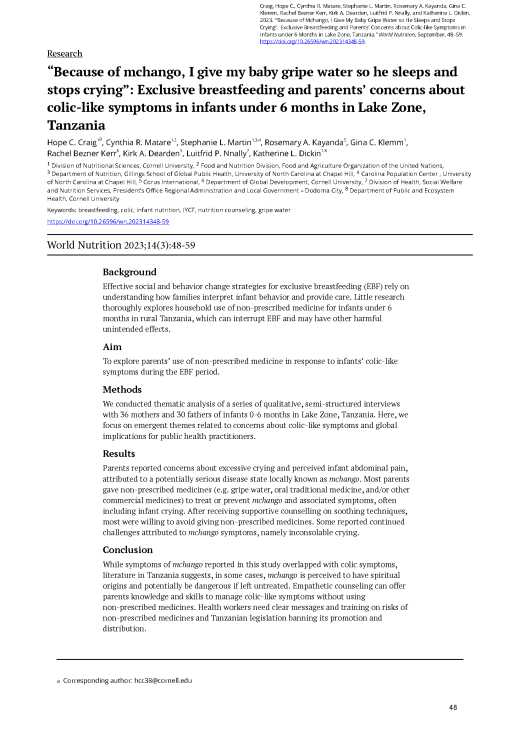“Because of mchango, I give my baby gripe water so he sleeps and stops crying”: Exclusive breastfeeding and parents’ concerns about colic-like symptoms in infants under 6 months in Lake Zone, Tanzania
Peer Reviewed Articles
“Because of mchango, I give my baby gripe water so he sleeps and stops crying”: Exclusive breastfeeding and parents’ concerns about colic-like symptoms in infants under 6 months in Lake Zone, Tanzania
Background
Effective social and behavior change strategies for exclusive breastfeeding (EBF) rely on understanding how families interpret infant behavior and provide care. Little research thoroughly explores household use of non-prescribed medicine for infants under 6 months in rural Tanzania, which can interrupt EBF and may have other harmful unintended effects.
Aim
To explore parents’ use of non-prescribed medicine in response to infants’ colic-like symptoms during the EBF period.
Methods
We conducted thematic analysis of a series of qualitative, semi-structured interviews with 36 mothers and 30 fathers of infants 0-6 months in Lake Zone, Tanzania. Here, we focus on emergent themes related to concerns about colic-like symptoms and global implications for public health practitioners.
Results
Parents reported concerns about excessive crying and perceived infant abdominal pain, attributed to a potentially serious disease state locally known as mchango. Most parents gave non-prescribed medicines (e.g. gripe water, oral traditional medicine, and/or other commercial medicines) to treat or prevent mchango and associated symptoms, often including infant crying. After receiving supportive counselling on soothing techniques, most were willing to avoid giving non-prescribed medicines. Some reported continued challenges attributed to mchango symptoms, namely inconsolable crying.
Conclusion
While symptoms of mchango reported in this study overlapped with colic symptoms, literature in Tanzania suggests, in some cases, mchango is perceived to have spiritual origins and potentially be dangerous if left untreated. Empathetic counseling can offer parents knowledge and skills to manage colic-like symptoms without using non-prescribed medicines. Health workers need clear messages and training on risks of non-prescribed medicines and Tanzanian legislation banning its promotion and distribution.
Read the article


